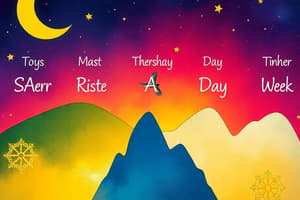Podcast
Questions and Answers
¿Cuál es el significado de 'Monday' en inglés?
¿Cuál es el significado de 'Monday' en inglés?
- Día de Mercurio
- Día del Sol
- Día de Marte
- Día de la Luna (correct)
¿Cuál es la traducción al español de 'Monday'?
¿Cuál es la traducción al español de 'Monday'?
- Martes
- Miércoles
- Jueves
- Lunes (correct)
¿Qué dios griego está asociado con el término 'Monday'?
¿Qué dios griego está asociado con el término 'Monday'?
- Neptuno
- Theia (correct)
- Urano
- Júpiter
¿Cuándo adoptó oficialmente el inglés la convención de nomenclatura de los días de la semana?
¿Cuándo adoptó oficialmente el inglés la convención de nomenclatura de los días de la semana?
¿Qué significa 'lunedì' en italiano, relacionado con 'Monday'?
¿Qué significa 'lunedì' en italiano, relacionado con 'Monday'?
¿De dónde proviene el nombre del lunes?
¿De dónde proviene el nombre del lunes?
¿Qué fenómeno se menciona en relación con el lunes?
¿Qué fenómeno se menciona en relación con el lunes?
¿Por qué la influencia de la luna en nuestras vidas sigue siendo un tema de interés en la investigación científica?
¿Por qué la influencia de la luna en nuestras vidas sigue siendo un tema de interés en la investigación científica?
¿Qué muestra la conexión entre el lunes y la luna según el texto?
¿Qué muestra la conexión entre el lunes y la luna según el texto?
¿Qué función cumple el lenguaje al nombrar los días de la semana según el texto?
¿Qué función cumple el lenguaje al nombrar los días de la semana según el texto?
Flashcards are hidden until you start studying
Study Notes
The Days of the Week in English: A Journey Through Monday
In English, the naming convention for the days of the week stems from historical roots, tracing back to ancient civilizations. Let's delve into the origins and meanings of our oldest and most recognized day of the week: Monday.
Origins and Etymology
The name "Monday" can be traced back to the Old English "Mōnandæg," which means "moon's day." This is due to the fact that the moon's rising and setting used to correspond with the first day of the week, as it was calculated based on the phases of the moon.
In Latin, the corresponding day was "dies lunae," which shares a similar meaning. In Greek, "theia selēnē" or "θεια σεληνη" translates to "goddess moon" and refers to the goddess Theia, who was associated with the moon.
This moon-based naming convention was quite common throughout European languages. The word "Monday" is similar across many languages, including Dutch (maandag), German (Montag), French (lundi), Spanish (lunes), and Italian (lunedì).
Adoption in English
The English language officially adopted the naming convention for the days of the week from the Latin version when the Romans conquered the British Isles during the first century A.D. However, the Old English terms for the days of the week were still used for a longer period, existing alongside the new Latin names.
The Old English naming convention for the days of the week is also interesting, as it was based on the Norse gods. Tuesday's name, for example, comes from Old English "Tīwesdæg," which refers to the god Týr.
Moon's Influence
The moon's influence on the naming of Monday is not limited to its ancient symbolism. Astronauts and space enthusiasts often refer to the "Monday Morning" phenomenon. During this time, the moon is in the same part of its orbit relative to Earth as it was at the beginning of the week.
Moreover, the moon's effect on our daily lives, including sleep patterns and mood, is still a subject of interest in scientific research.
Conclusion
The naming of Monday reveals our ancient connection with the moon and sky, which continues to influence our daily lives. The language we use to label the days of the week serves as a reminder of our history, as well as a testament to the universality of timekeeping throughout human civilization.
Studying That Suits You
Use AI to generate personalized quizzes and flashcards to suit your learning preferences.




